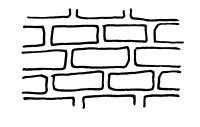Party Wall Basics
If you need help and advice with regard to disputes, particularly Party Walls matters, or you require a structural survey or a schedule of condition or dilapidations report or help with any other property matters please call 0800 298 5424 for a friendly chat.
Party Wall etc Act 1996 basics
 The following article will help you get a basic understanding of the Party Wall process as set out within the Party Wall etc Act 1996. We would recommend the Party Wall etc Act 1996 explanatory free booklet that is available from the office of the Deputy Prime Minister: website odpm.gov.uk
The following article will help you get a basic understanding of the Party Wall process as set out within the Party Wall etc Act 1996. We would recommend the Party Wall etc Act 1996 explanatory free booklet that is available from the office of the Deputy Prime Minister: website odpm.gov.uk
The aims of these articles are to give a basic understanding (although not detailed understanding) of the Party Wall etc Act 1996. This particular article looks at the terms used in the Party Wall world.
Free phone 0800 298 5424
A Party Wall defined

This is a wall that stands astride a boundary of land belonging to two or more different owners.
Interestingly enough, the Act doesn't just relate to Party Walls (that is why we have the etc. bit) and also it redefines different types of Party Walls.
Party Fence Wall
The first term we will look at is the Party Fence Wall. This is a wall that doesn't form part of a building and stands astride the boundary line between lands of different owners. In summary, it is used to separate these lands. Typically, it is a garden wall and that is what most people would call it, but it doesn't include a wooden fence!
Line of junction
The term line of junction is often used in the party wall world to mean a boundary line.
The other type of Party Wall
This is a Party Wall that sits wholly on the land of one of the owners, but is used to separate or divide their land or buildings. A good example of this is where a garden wall has been built, building on one person's land and next door builds a house extension utilising this wall. Another term used in the Party Wall world is party structure and this is more of an all embracing term that can be used for walls or floors, for example that divide flats, but still fit the interpretation of astride a boundary of land between two different owners.
Who do Party Walls affect and more specialist terms that are used
The land or building owners terms
The first term to get used to is that a building owner, and this is usually the person that wants any work to be carried out, initiates the Party Wall Act. The second term that is often used is adjoining owner. This has slightly different connotations, as it can relate to the actual freeholder of the property or the leaseholder or leaseholders, with regard to a lease the interest has to be greater than one year. Therefore, an adjoining owner can in fact be several people or companies. These terms are very much used in abundance so you should get used to the term building owner and adjoining owner.
Terms used for the different sorts of surveyors
Initially in any dispute the building owner will seek advice and guidance from a specialist building surveyor (also sometimes known as the unappointed surveyor). The surveyor will advise and help the building owner to serve a notice on the adjoining owner. It is only when dispute arises from this notice served that we move onto the next stage and that is where we have appointed surveyors. There will be an appointed surveyor for both the building owner and the adjoining owner. However, there is another alternative, which is where both the building owner and the adjoining owner agree on having an agreed surveyor; so this is one surveyor appointed in agreement by both the building owner and the adjoining owner to see through the Party Wall etc Act 1996.
It is the ideal situation, in our opinion, particularly with domestic disputes. However, frequently both sides wish to have their owner surveyor feeling rightly or wrongly, and we would say wrongly, that the surveyor will be acting on their behalf. They are in fact not acting on their behalf but simply ensuring that the Party Wall etc Act 1996 is carried out correctly.
There is a further surveying term used and that is the third surveyor. This is the surveyor that is selected by the two appointed surveyors, so that if there are any difficulties they can hopefully be resolved. We have carried out an article specifically on third surveyors which we would refer you to.
Why do people use the Party Wall etc Act 1996?

It is because they gain more rights than they do have under common law. However, unless the Notice is served correctly and the surveyors have authority to act, the Party Wall etc Act 1996 does not exist. We have heard it explained as if you are going to a party without an invite to get the Party Wall Award started.
Then, in its simplest form, the building owner will work with his Party Wall surveyor and the adjoining owner will work with this Party Wall surveyor to have whatever work the building owner is wishing to have carried out and the adjoining owner to influence the work (but not stop it) until the work is completed. This is the ideal scenario.
How does the Party Wall etc Act 1996 work?
From a building owner's point of view they need to appoint a Party Wall surveyor. In our experience, we would recommend that they first of all seek advice from the surveyor as to their situation prior to instructing the Party Wall surveyor, as in some cases the Party Wall etc Act 1996 is not appropriate. Typically, Party Wall Notices will be required for any work that requires taking a bearing off the wall, any alterations to the wall, i.e. raising it, thickening it or cutting it down or off, demolition and rebuild or protecting work. Smaller works, such as adding a flashing or fixing a shelf (although in theory you are taking a bearing off the wall), or cutting it away to put electrical points in are too small to mention.
The key point with regard to the Party Wall Act is where there could be a consequence for structural strengthening or support, etc, or that to the adjoining property then the Party Wall etc Act 1996 applies.
See our other articals regarding Party Walls:
What is a Third Surveyor in Relation to Party Wall Act etc 1996?
If you truly do want an independent expert opinion from a surveyor to specialise in Party Wall work please contact us on 0800 298 5424 for a surveyor to give you a call back. We are also happy to carry out third surveyor work. If you require a structural survey, a schedule of condition, a dilapidations report, specific defects report, home buyers reports or any other property matters please contact us.
If you have a commercial property, be it leasehold or freehold, then you may wish to look at our Dilaps Website at www.DilapsHelp.com and for Disputes go to our Disputes Help site www.DisputesHelp.com .
We hope you found the article of use and if you have any experiences that you feel should be added to this article that would benefit others, or you feel that some of the information that we have put is wrong then please do not hesitate to contact us (we are only human).
The contents of the website are for general information only and is not intended to be relied upon for specific or general decisions. Appropriate independent professional advice should be paid for before making such a decision.
All rights are reserved the contents of the website are not to be reproduced or transmitted in any form in whole or part without the express written permission of www.1stAssociated.co.uk.
